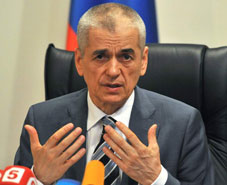
Russia's chief sanitary doctor blocks some Georgian wines
By Tatia Megeneishvili
Wednesday, October 9
Russia’s state consumer protection agency, RosPotrebNadzor, has blocked 28 brands of alcoholic drinks, produced by seven Georgian companies, from entering the Russian market. Their failure to meet hygienic standards was named as a reason for the ban.
The list includes Imedi 96, Schuchmann Wine companies, and the Askaneli and Akhalsheni 2005 brandies, among others that were banned.
Head of RosPotrebNadzor, Gennady Onishchenko, told the Russian service of BBC that long-term stable and civilized relations with Georgia can only be based on the stability of the quality of the wine products.
“This abundance of negative conclusions shows that not all Georgian winemakers have learned the lessons from the situation that persisted for many years,” stated Onishchenko, referring to the Russian ban on the import of Georgian products, which was imposed in 2006 and removed only in 2013.
“It gives us all a reason for a possible revision of our attitude towards the intentions of the Georgian side to mend business and partnership relations,” he stressed.
The head of LEPL National Wine Agency of Georgia, Levan Davitashvili, said that there is nothing to worry about and that this information is pretty old. “We hope that our relationship, what we have achieved in terms of exports, will not be delayed,” stated Davitashvili.
Representatives of the wine companies also see nothing alarming in this news. They said they already are producing products for Russia and that only some brands were banned not the companies themselves.
Member of parliamentary majority, Zurab Tkhemaladze, said that this fact is a natural moment as “those companies are producing different kinds of products. “It is obvious that not all of them will be approved by other countries,” Tkemaladze said, adding that Georgia is going to have healthy relations with the Russian market without refusing from the national interests.
Member of parliamentary minority, Mikheil Machavariani, said that they had been warning the Georgian government about such consequences, but they were not listening to the minority’s advice. “We must think twice about what Russia is offering us,” stated Machavariani.
So far total of 95 Georgian producers of alcohol drinks and seven mineral water producers have been given the green light to sell their products on the Russian market. Since early summer, when Russia dropped the ban on the import of Georgian wines, a total of 6.13 million liters of alcoholic beverages, mainly wine, produced by 22 companies, has been imported from Georgia into Russia, according to the Rospotrebnadzor.

